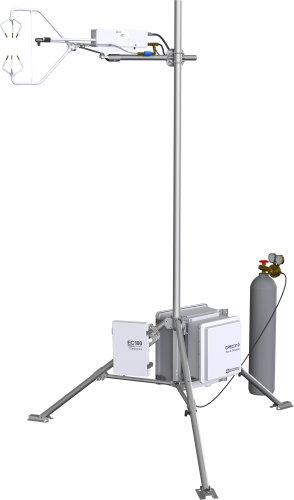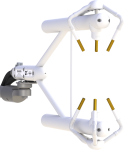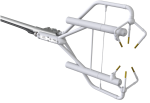
Provides additional ports with automatic zero and span






Overview
The CPEC310 with EasyFlux® is a turn-key, closed-path eddy-covariance (EC) flux system for long-term monitoring of atmospheric-biosphere exchanges of carbon dioxide, water vapor, heat, and momentum. A complete system consists of a closed-path gas analyzer (EC155 closed-path gas analyzer), sonic anemometer (CSAT3A sonic anemometer), data logger (CR6 datalogger), sample pump, three-valve module that enables automatic zero and CO2 span measurements (manual H2O span), and accommodations for a CDM-A116 analog input expansion module allowing for additional sensors.
The gas analyzer’s patented vortex intake design (United States Patent No. 9,217,692) and small sample cell volume (5.9 mL) provide a much lower flow rate than other closed-path systems while maintaining excellent frequency response (4.3 Hz cutoff frequency). Additionally, this design makes the system virtually maintenance free while still maintaining an ideal frequency response compared to traditional inline filters. Lower flow allows the CPEC310 to have one of the lowest total system power requirements (12 W) of any closed-path eddy covariance system. Campbell Scientific manufactures all components of the CPEC310, including the data logger and EasyFlux® DL software for computing and correcting fluxes, which gives our system the most reliable functionality.
Read MoreBenefits and Features
- New conformal coating helps protect sonic transducers in corrosive environments
- Expandable, high-end system with CR6 datalogger processing power and EasyFlux® DL software to compute and fully correct up to 20 Hz data
- The three-valve module makes the CPEC310 the only closed-path eddy covariance system on the market with the ability to perform automatic zero and CO2/H2O span
- Additional port options for energy balance and atmospheric sensors
- Ideal system for short or tall towers
- Simple design provides easy use while maintaining full functionality
Images





Detailed Description
The gas analyzer’s small sample cell volume (5.9 mL) minimizes the sample residence time (50 ms at the system’s nominal flow rate, 7 LPM). This gives excellent frequency response (5.8 Hz half-power bandwidth) with low total system power (12 W).
Eddy-Covariance Measurements
CO2 and H2O are measured with an EC155 Closed-Path Gas Analyzer. Three-dimensional wind speed and sonic air temperature are measured with a CSAT3A sonic anemometer head.
CPEC310 System Enclosure
The CPEC310 has two enclosures: a fiberglass enclosure that houses the CR6 datalogger, pump module, three-valve module, and optional CDM-A116, and the EC100 enclosure for data processing. The CPEC310 can also be equipped with a scrub module for automatic zeroing of the EC155.
CPEC310 Pump Module
The pump module, a standard component of the CPEC310 system, consists of a small dual-head diaphragm pump with a brushless dc motor mounted inside a fiberglass enclosure. An integral cable connects the pump module to the CPEC310 system enclosure, which provides power, temperature measurement and control, pressure measurement, and pumping speed measurement and control.
Specifications
| Operating Temperature Range | -30° to +50°C |
| Input Voltage Range | 10.5 to 16.0 Vdc |
| Power |
|
System Enclosure |
|
| Dimensions | 54 x 44.5 x 29.7 cm (21.3 x 17.5 x 11.7 in.) |
| Weight |
|
Pump Module |
|
| Inlet Connection | 3/8-in. Swagelok |
| Pressure Sensor Range | 15 to 115 kPa |
| Pumping Speed | 3 to 9 LPM (automatically controlled at the set point, typically 7 LPM) |
Three-Valve Module |
|
| Inlets for Module | Zero, CO2, and H2O span |
| Outlets | Analyzer and H2O bypass |
| Connections | ¼-in. Swagelok |
| Dimensions | 14.0 x 12.7 x 14.0 cm (5.5 x 5.0 x 5.5 in.) |
| Weight | 1.5 kg (3.3 lb) |
Scrub Module |
|
| Power |
|
| Cylinder Volume | 480 cm3 each (29.29 in.3 each) |
| Molecular Sieve Size | 1.6 to 2.5 mm beads (0.063 to 0.098 in. beads) |
| Enclosure Dimensions | 39.4 x 34.3 x 20.3 cm (15.5 x 13.5 x 8.0 in.) |
| Weight | 9.6 kg (21.1 lb) |
Documents
Brochures
Manuals
Technical Papers
- The CPEC310 Advantage
- EC150, IRGASON, or EC155: Which CO2 and H2O Eddy-Covariance System Is Best for My Application?
- Quantifying Frequency Response of a Low-power Closed-path CO2 and H2O Eddy-covariance System
- Damping Temperature Fluctuations in the EC155 Intake Tube
- Molecular Sieve CO2 and H2O Scrubbing Solution
- Replacing the Vortex Intake in an Older EC155
- An eddy-covariance system with an innovative vortex intake for measuring carbon dioxide and water fluxes of ecosystems
Compliance
Miscellaneous
- Performance Evaluation of an Innovative Sampling System for Closed Path Eddy Covariance Measurements
- Using Molecular Sieve to Zero Infrared Gas Analyzers for Eddy Covariance or Atmospheric Profile Measurements
- Field-Performance Verification of Carbon Dioxide, Water, and Nitrous Oxide Closed-Path Eddy Covariance Systems with Vortex Intakes Poster
Downloads
CR6 OS v.14.01 (8.56 MB) 26-09-2024
This download is for the CR6 datalogger. Execution of this download places the Operating System file(.obj) on your computer. It also updates the CRBasic Editor compiler and support files.
Why Update? UID (unique identifier) is now utilized for enhancing security along with other features and bug fixes. With this OS update it is recommended that you also update the Device Configuration Utility to the most recent version so that new datalogger features are available in the utility.
Note: Campbell Scientific always recommends updating operating systems on site if possible. When remote updates are required, it is recommended that you implement the necessary precautions to handle unexpected OS upload complications. All datalogger settings should be retained when updated remotely. If you choose to roll back to a previous operating system, the datalogger settings will be reset to default.
Watch the Video Tutorial: Sending an OS to a Local Datalogger.
EC100 OS v.8.02 (560 KB) 14-10-2019
EC100 Operating System.
Watch the Video Tutorial: Updating the EC100 Operating System.
ECMon v.1.6 (10.7 MB) 29-03-2016
EC100-Series Support Software.
Device Configuration Utility v.2.32 (47.7 MB) 19-03-2025
A software utility used to download operating systems and set up Campbell Scientific hardware. Also will update PakBus Graph and the Network Planner if they have been installed previously by another Campbell Scientific software package.
Supported Operating Systems:
Windows 11 or 10 (Both 32 and 64 bit)
EasyFlux DL for CR6CP v.1.08 (132 KB) 13-06-2024
CR6 datalogger program for Campbell closed-path eddy-covariance systems.
CSAT3H Heater Controller v.14.2 (46 KB) 02-02-2021
The CSAT3H Heater Controller ships with this encrypted program. This program is for the unlikely event that the program needs to be re-installed or updated to a newer version. Please contact Campbell Scientific if you have questions about the program or would like the algorithm modified for a specific application.
Frequently Asked Questions
Number of FAQs related to CPEC310: 6
Expand AllCollapse All
-
No. A valve module is required to use the Scrub Module. Only the CPEC310 comes with a valve module.
-
Yes. For more information, refer to the "CPEC200 Scrub Module Installation, Operation and Maintenance" appendix in the CPEC200 Closed-Path Eddy-Covariance System Instruction Manual.
-
The molecular sieve is a non-hazardous material that can be shipped to any country.
-
The molecular sieve is a direct replacement for the old magnesium perchlorate bottles. The molecular sieve may be used for any Campbell Scientific analyzer that used the old bottles.
-
The molecular sieve has been demonstrated here by our engineering department to be effective at removing CO2 and H2O from the air sample. The change was made for two reasons:
- It was a safer alternative than using the previous chemicals.
- Increased shipping regulations for the chemicals limited the number of suppliers.
-
The bottles of sieve for drop-in replacement contain the pellets and a membrane on top. The membrane is necessary to keep the pellets contained while allowing gas to pass over the zeolite. The bottle has the same footprint as the old magnesium perchlorate bottles. The amount in each bottle is listed on the bottle. The amount of sieve needed for each analyzer is the following:
- The EC150 needs 22 g (drop-in bottle).
- The IRGASON® needs 22 g (drop-in bottle).
- The EC155 needs 22 g (drop-in bottle).
- The AP200 needs 500 g (refill).
- The 27423 needs 1000 g (refill).
- The 31022 needs 500 g (refill).
Case Studies
This case study discusses the integration of CPEC310 and AP200 systems to explore the theories......read more
Articles and Press Releases
Privacy Policy Update
We've updated our privacy policy. Learn More
Cookie Consent
Update your cookie preferences. Update Cookie Preferences





